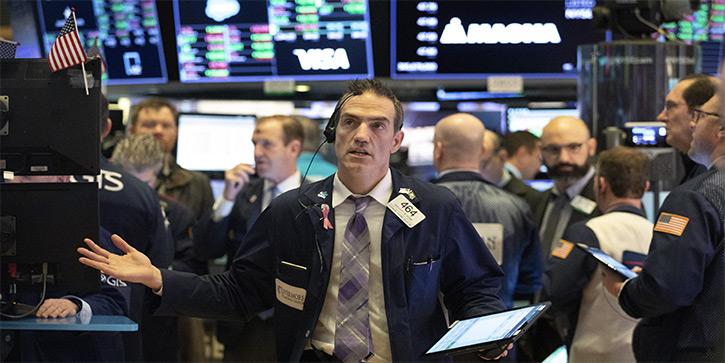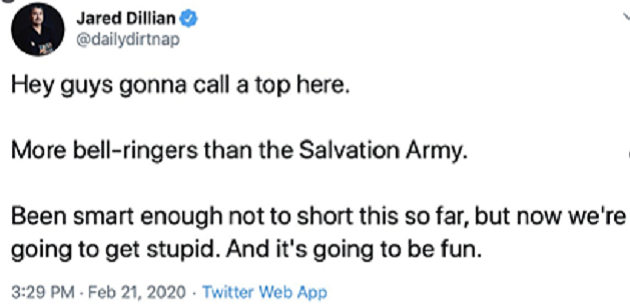
Markets in Turmoil
-
 Jared Dillian
Jared Dillian
- |
- March 5, 2020
- |
- Comments
People like to make fun of the fact that whenever CNBC breaks out the “Markets in Turmoil” special, markets rally. Not this time!
This is my twenty-first year in the capital markets. I have seen some crazy stuff. Actually, 99% of the stuff I have seen is boring stuff, but it’s the crazy stuff that I remember.
I know plenty of wiseguys read this newsletter, people who have the ability to short things, and trade derivatives, and do all kinds of fancy stuff. Most people just buy things, and for them, it often comes down to very brief moments where they have to decide to buy something cheap. Those decisions are hard because it often feels terrible.
Let me tell you about something I call the 3 Cs of trading in a crisis. I published this in The Daily Dirtnap last week.
The 3 Cs of trading in a crisis are:
- Capital
- Conviction
- Courage
Capital
In order to buy stuff, you need cash.
If you have cash, it means you weren’t fully invested on the highs.
This time around, like most times, everyone was fully invested on the highs.
Cash yields nothing, so people were very scornful of cash, considering it a drag on performance. But people forget about the option value of cash, the idea that cash is a big pile of possibilities, and it allows you to buy things cheaper in the future.
This is why you always keep cash around.
People never, ever learn this lesson, no matter how many times they get burned. Again and again, markets go up, people chase performance, and feel the need to be fully invested… on the highs.
Don’t be one of these people.
Conviction
Conviction is how sure you are on a trade.
There is one easy way to get more conviction on something: do a lot of research on it. The more you know about something, the better you feel about it, and the more comfortable you are. Although there is such a thing as knowing too much.
Just because you have conviction on a trade doesn’t mean you are right. You can have conviction and be wrong. But conviction is necessary to get comfortable with a trade, which will help you size it appropriately.
Like what you're reading?
Get this free newsletter in your inbox every Thursday! Read our privacy policy here.
Courage
Oftentimes, these opportunities happen when things look really bad. And even if you have the capital, and you have the conviction, working up the courage can be tough.
We had some 1,000-point down days in the Dow last week. Takes some courage to buy the market down 1,000 points. Never feels good when you push the buy button. If it does, then you are a psychopath.
I have never had a shortage of courage in my career, which some people confuse with bravado. I’m a trader, and it’s in my DNA. I’m always up for taking a risk. I’ve done some big, big trades in my career, and I’ve never had any fear.
I’m unusual—don’t confuse courage with fearlessness—it’s normal to experience fear—even healthy. You shouldn’t be a kamikaze like me.
It’s good to deliberate about a trade, and really think about what you are doing. But don’t take too long—sometimes it comes down to a matter of seconds.
Falling Knives
There’s an old saw that you shouldn’t catch a falling knife.
Eh. If you’re a long-only investor, there will be times in your investing career when you are forced to do that. I actually disagree with the conventional wisdom. Within the professional trader community, you want to buy high prices and sell even higher. But most people aren’t traders, and they will want to take advantage of low prices to buy.
The problem with this is that most people aren’t contrarians—they aren’t psychologically wired to buy when others are selling. But my assumption is that most readers of this newsletter have some familiarity with the idea that you’re supposed to do the opposite of what other people are doing.
Long-only stock investors shouldn’t buy the little dips, but they should buy the big dips.
Of course, there are 100 words left, so it’s time for me to climb back on my hobby horse about asset allocation. If you had a 35/65 allocation to stocks and bonds, you wouldn’t have felt this correction a bit.
The goal isn’t simply to live a stress-free financial life and not get stressed out by your portfolio. Your goal is to not even THINK about your portfolio and check in on it once every six months or so.
In the last week, my heart rate didn’t go up one single beat per minute. And that is how it should be.
I doubt those of you with an 100/0 allocation to stocks and bonds can say the same. Even if you have an 80/20 portfolio because some broker told you it was “safe”, you’ve likely had a moment or two of rapid-fire breathing recently.
This is why I keep going on about the 35/65 portfolio. You can’t really afford to be too low on bonds in a high-volatility environment like this.
But let me tell you: It’s not enough for you to hear me say all of this once a week or once a month. If you truly want to learn about the 3 Cs—Capital, Conviction, and Courage—and have this knowledge seep straight into your bone marrow and completely live it... you should hear this every day of your life as an investor. Because it takes that much reinforcement to live, breathe, and feel comfortable with the 3 Cs and to follow through on those high-conviction trades.
Like what you're reading?
Get this free newsletter in your inbox every Thursday! Read our privacy policy here.
Look, I’m not always right. In fact, I am frequently wrong. But when volatility picks up and panic sets in, I have good instincts. For example when I was calling the top of the market a few weeks ago, on Feb. 21:

Bottom line is, the markets are changing and volatility is back. And it can get really scary out there, so you want someone who’s with you (almost) every day to tell you stuff like this:
“Overarching point here is that people are smart, and people figure things out, and to be short stocks for more than 15% means that you are short human ingenuity. Coronavirus is a natural disaster. Generally, you don’t worry about natural disasters in the market—you worry about the man-made ones. Those tend to be much worse.”
“I hesitate to say that the lows are in, but my gut tells me the lows are in, or close to it. I would not make any big bets on that, other than to make a shopping list of far-undervalued stocks you want to buy.”
“I think you know deep down what is required here. What is required is to do the hard thing.”
Those are all direct quotes from The Daily Dirtnap—which consists of two to three pages that I write and email to you almost every day, about 255 days per year.
I’ve had a lot of people tell me that they find it incredibly reassuring that I’m with them basically nonstop, showing them how to navigate the markets and telling them it’ll be okay. It’s like investment therapy. I bet they find it even more soothing when they make a bunch of money on one of my contrarian plays.
But I could talk all day long. Why don’t you find out for yourself what it feels like to have this one-of-a-kind, constant companionship? Just give The Daily Dirtnap a try today.

Jared Dillian
subscribers@mauldineconomics.com

 Jared Dillian
Jared Dillian
